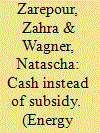| Srl | Item |
| 1 |
ID:
186450


|
|
|
|
|
| Summary/Abstract |
The 2010 energy subsidy reform in Iran is a unique case of redistributive policy as the savings from the subsidy cut have been redirected to households as unconditional, universal cash transfer. While theoretically, the cash transfer was large enough to keep the utility of the average household at the initial level, this study explores the practical impacts of the reform. We analyze panel data on income/expenditure of Iranian households for the period 2010–2012. Since this is a universal reform, we exploit the time dimension and the intensity of energy consumption in the identification and assess the robustness of the results with sub-sample and placebo analyses. Overall, the energy subsidy reform caused a significant shrinkage (7%–9%) in households' real consumption. The cash transfer failed to fully compensate the negative impact of the subsidy removal. The impact is heterogeneous, varying along the intensity of energy consumption, geographical location, income and the share of the cash transfer in a household's income. A non-negligible policy accomplishment of the reform is that within its first two years poverty was mitigated in absolute and relative terms and income inequality slightly improved. Nevertheless, the government is under pressure because inflation counteracts these gains.
|
|
|
|
|
|
|
|
|
|
|
|
|
|
|
|
| 2 |
ID:
176808


|
|
|
|
|
| Summary/Abstract |
We analyze the impact of the unconditional cash transfer program, namely the Benazir Income Support Program (BISP) on fuel choices among ultra-poor in Pakistan using two rounds of household-level data collected in 2011 and 2016. The analysis based on regression discontinuity design shows that BISP cash transfer has a significant impact on interfuel substitution. Cash transfer increases the use of modern fuels among BISP beneficiaries. Besides, cash transfer also encourages the use of intermediate fuels, even in some cases traditional fuels. Cash transfer also increases the share of fuel expenses in total household expenses. Therefore, the fuel stacking theory provides a better explanation of interfuel substitution than the energy ladder theory of the cash transfer program. The provincial analysis shows that interfuel substitution exists due to cash transfer but varies from province to province, signifying the role of regional heterogeneities. The net impact on fuel choices may depend on the availability of different fuel components. From policy perspective, the expansion of the cash transfer program, as planned by the government, would require a reasonable investment in the energy sector to ensure an uninterrupted supply of modern fuels.
|
|
|
|
|
|
|
|
|
|
|
|
|
|
|
|
| 3 |
ID:
124425


|
|
|
|
|
| Publication |
2013.
|
| Summary/Abstract |
The study of the transnational transfer of practices and institutions generally looks at the intermediary and final stages of the process, with much less attention devoted to its initial steps. In contrast, this article theorizes the early part of the trajectory of transfer, conceptualized as the process through which local ideas and practices are turned into a "standard model," which we term the process of standardization. Drawing upon the public policy and social movement literatures, we identify three potentially robust mechanisms as central to the process of standardization-certification, decontextualization, and framing-and apply this framework to two cases: the transnational spread of Truth and Reconciliation Commissions and the use of conditional cash transfers as a social policy instrument. We find that the key actors in shaping the content of these standards were neither the innovators nor the early adopters but intermediary entrepreneurs located at the intersection of a complex mix of state and nonstate networks.
|
|
|
|
|
|
|
|
|
|
|
|
|
|
|
|